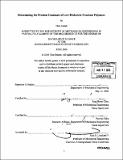Determining the Preston constants of low-dielectric-constant polymers
Author(s)
Eusner, Thor
DownloadFull printable version (1.264Mb)
Other Contributors
Massachusetts Institute of Technology. Dept. of Mechanical Engineering.
Advisor
Jung-Hoon Chun and Nannaji Saka.
Terms of use
Metadata
Show full item recordAbstract
An important step in the manufacture of integrated circuits (ICs) is the Chemical Mechanical Polishing (CMP) process. In order to effectively use CMP, the removal rates of the materials used in ICs must be known. The removal rate of a given material by CMP can be determined once its Preston constant is known. The objectives of this work were to develop a method to determine the Preston constants and to measure the Preston constants of four low-dielectric-constant (low-k) polymers, labeled A, B, C, and D, and Cu. A weight-loss method, which measures the weight difference between the initial wafer and the polished wafer, provided repeatable results. The Preston constants ranged from 1.01 to 5.96 x10-'3 m2/N. The variation in measurements of the Preston constant ranged from 16% to 31%. The Preston constant of Cu was found to be 1.60 + 0.50 x10-13 m2/N. Of the four polymers, Polymer A had the smallest Preston constant, 1.01 i- 0.30 x10-13 m2/N. It was also determined that there is an approximate inverse linear relationship between the Preston constant of the four low-k polymers and their Young's moduli of elasticity. An approximate inverse linear relationship between the Preston constant of the four low-k polymers and the hardness was also observed.
Description
Thesis (S.B.)--Massachusetts Institute of Technology, Dept. of Mechanical Engineering, 2006. Includes bibliographical references (leaf 30).
Date issued
2006Department
Massachusetts Institute of Technology. Department of Mechanical EngineeringPublisher
Massachusetts Institute of Technology
Keywords
Mechanical Engineering.